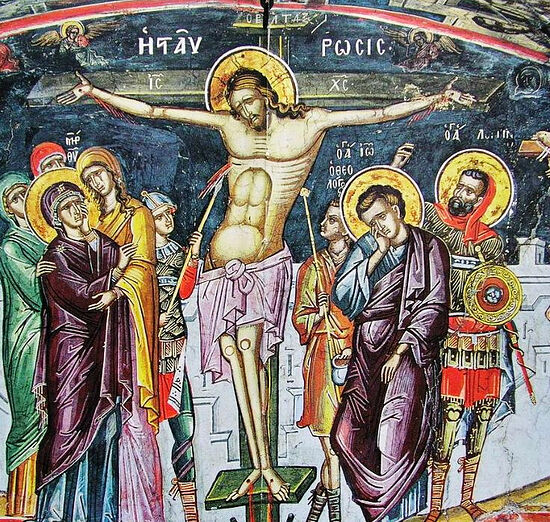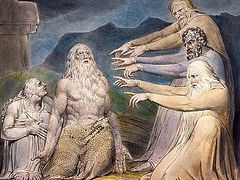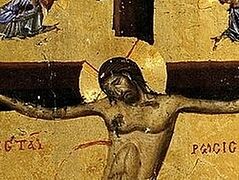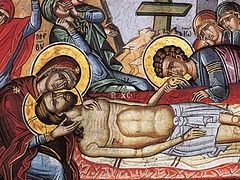Having come now to the veneration of the Passion of Christ, I think, brethren, we would all like to hear something from the Cross of the Lord for our edification. But the Cross is silent! It’s silent because everything was said from it once and for all at Golgotha: There a sermon was preached that should be heard by peoples and the ages unto the end of the world. Therefore, desiring to hear the teaching from the Cross, we must, brethren, bring reverent thoughts to the hill of the Cross, stand at the foot of the crucified Lord and attend to what comes from His mouth. In this way, you can hear the preaching of our Savior and Lord, and His Cross won’t seem to be silent. To make this holy work easier for you, I will take on the role of the narrator, and try to present to you the final sayings of the Lord from the Cross, in as clear a light as possible for you.
Seven times the mouth of the Lord opened upon the Cross, as though according to the number of the seven thunders that, according to the testimony of the seer of mysteries, will sound forth before the end of the world (Rev. 10:3). The first three sayings concern more those who surrounded the Lord in His final minutes; the last four directly express His own state upon the Cross. But let us turn to the Cross of Christ itself.
After various sufferings in the courtyard of Caiaphas, in the praetorium of Pilate, and in the courtyard of Herod, after the exhausting procession to Golgotha under the weight of the Cross, finally came the moment of execution. The tree is set firm in the ground. The last pieces of His clothing are removed. The crucified One is lifted up upon the Cross. His arms and legs are stretched out. The terrible hammer pounds. Blood flows in torrents to the ground… What would an archangel himself say at this moment, in this place?...
The God-Man meekly raises his eyes to Heaven and prays, for all to hear. What about? About taking revenge on enemies, about defending His cause, about sending Him patience? No: Father, He says, forgive them; for they know not what they do (Lk. 23:34). They know not! Well! The Roman soldier who crucified Him didn’t know what he was doing; he wasbut a blind instrument of the commandments of his procurator Pilate; the Jewish mob didn’t know what it was doing, instigated by the sycophantic and at the same time menacing suggestions of their blind leaders and rulers; the Sanhedrin itself, for all its immorality, probably didn’t know it was encroaching upon the life of its true Messiah. Let us say in the words of the Apostle: For had they known it, they would not have crucified the Lord of glory (1 Cor. 2:8). However, how many crimes there were in this ignorance, especially with those who so easily could have known everything, but closed their eyes a hundred times so as not to see anything!
And it’s completely forgotten by Him Who was crucified! How many clear traces of deliberate cunning and low cruelty there are in this ignorance, which exposed the personal malice of Christ’s enemies and persecutors and their clear desire to increase the horror of this already terrible execution, and to defame the Cross, which is shameful in itself! But the Crucified One ignores all this! And He felt the severest pains at the piercing of His hands and feet! Was not this alone enough to cause the Crucified One to give His first thought now to Himself, to His own sufferings? But the crucified God-Man is exalted in spirit above all, forgetting His Cross and His death. And how the High Priest after the order of Melchizedek, having just ascended the Cross, raises a prayer for His enemies: Father, forgive them; for they know not what they do! Who, by this one characteristic alone, cannot recognize the Crucified Lamb of God, slaughtered for the sins of the whole world? And moreover, who of His true followers will not give an oath to be meek to his enemies? Anyone who hasn’t forgiven their enemies at least once in the name of their crucified Savior Who prayed for His enemies from the Cross isn’t a Christian!
From His crucifiers and enemies, the Lord’s gaze from the Cross turned to His Mother and the disciple—friends who, unrestrained by any fear, finally had the chance to draw near, through the crowd of people, to the Cross, so that they could be seen from it. In another time, in another place, such zeal and such nearness would have been a consolation, But now, but here!... The sight of His inconsolable Mother and disciple, torn apart by grief, was yet another source of suffering for the loving heart of the Son. But will not this heart have courage and love for His beloved ones?
When it was time to work a miracle of omnipotence, the Lord said to His Mother at the wedding in Galilee: Mine hour is not yet come (Jn. 2:4). At the marriage upon Golgotha comes the hour for all things! Gazing upon His Mother, The Lord immediately said: Woman, behold thy son! Then to His disciple: Behold thy mother! (Jn. 19:26-27). No greater consolation could have been given from the Cross to His Mother or friend. Brethren, this is the same as to say that there could be no greater admonition to us about the sanctity of familial relations and friendships. In fact, think about it: If the Son of God, before His very death, was a loving Son to His Mother, a constant friend of His disciple, then what title or what relationship could excuse you from fulfilling the holy duty of love to your family and friends? When the Cross didn’t prevent Him from making His last will, ensuring the earthly state of the Mother He was leaving behind, then what can prevent us from caring about the fate of those who will remain after our repose? The Apostle of Christ long ago noted that he who is negligent about his relatives hath denied the faith, and is worse than an infidel (1 Tim. 5:8).
It would seem they were embraced from the Cross with the most pure love, prayer for enemies, and a loving testament. But there was still a place in the center, at the very heart, not yet pierced by a spear, but open to everyone. Who will occupy this place? The repentant thief. Two malefactors were crucified—one on the right and the other on the left, precisely so that the crucifixion of the Lord would be even more shameful in the eyes of the whole of Jerusalem: Who cares about this this love, which beareth all things! (1 Cor. 13:7). One of these men hanging there begs to be remembered in His Kingdom—and will be remembered this very hour. The King of this Kingdom is Himself on the Cross in terrible agony, and no one cares. His hands being nailed to the Cross doesn’t hinder the Lord of life and death from opening Paradise, closed by the sins of man. Today shalt thou be with Me in Paradise (Lk. 23:43), the Lord responded to the prayer of the repentant thief. Oh, again, who cannot see in but this one feature the Only-Begotten Son, to Whom the Fathers gives everything, Who even upon the Cross remains the Lord of life and death, the Lord of Paradise and hell! I’m not even talking about the Lord’s forgetfulness of His own sufferings. Hearing the royal words: Today shalt thou be with Me in Paradise, you can’t help but think you’re hearing them not from the Cross, but from the royal throne. That’s what it means, brethren, to do your work while it is day (Jn. 9:4), while there remains the last ray of this day. This is how you can sanctify the very last moments of your life, your very sufferings, your very struggle with death—by works of love for others! Blessed is he who, like his Savior, can use his gift of speech for the last time on his deathbed to offer some word of edification or consolation for his fellow man!
Judging by these three utterances from the Cross—by the prayer for His crucifiers, by the bequest to His Mother and disciple, and by the promise of Paradise to the thief, one might think that He Who is crucified isn’t Himself suffering any torments. Alas, but these torments were terrible! One of the indirect effects of crucifixion was that the blood of the crucified stops its natural circulation, and rushes to the heart, producing the most tormenting hunger and thirst. The Only-Begotten Son of God now experiences this hunger and thirst on the Cross. He Who has hitherto forgotten all His sufferings with such selflessness would undoubtedly have enough courage now to keep these things to Himself—but what would it serve to conceal the Cross, which already contains so many mysteries?
The universe had to know, men had to hear from the mouth of the universal Sacrifice Himself what the cleansing of the sins of the entire world is worth. And the Son of Man always was what He was: He rejoiced when there was cause to rejoice; He wept at the grave of Lazarus or when he looked upon Jerusalem, which was perishing in sins. Therefore, even now, burning with mortal thirst, the God-Man loudly exclaimed: I thirst! (Jn. 19:28). To satisfy this need of those who were crucified, compassionate people were wont to bring various kinds of drinks. But the malice of Jesus’ enemies considered it their duty to spoil even these tiny drops of consolation for Him. We know, brethren, how and with what the Lord’s thirst was quenched—with vinegar and gall!... Blessed are we if we do not quench it with the same even now! For the Lord now thirsts for our salvation! And what are our sins for Him other than vinegar and gall?
This is a painful exclamation: I thirst! You could see, brethren, that the torments of the most pure flesh of the Lord had reached the extreme degree of human suffering. But as a sacrifice for the sins of the entire world, there awaited another, crueler suffering, which none of us can bear—such a torment as cannot be produced by all human malice and power. Who produced it?—the Father! The Father Himself! His justice! Being one with the Father in Divinity, the God-Man, amidst the cruelest of mental and bodily sufferings, could have received strength and consolation from the awareness of this unity unto His relief. Justice, punishing the sins of the people in His Person, demanded that this source of consolation be completely obstructed—and it was obstructed! The Father Himself forsook the Son! Without being separated from humanity, the Divinity was so concealed in the soul of the crucified God-Man that His humanity was betrayed to all the horrors of helpless grief, and He abode as one of us. Such a feeling of abandonment at such moments was the height of torment, now not just for His most pure body, but also for His most holy soul and spirit. For what does such abandonment imply? All of the most terrible and inconsolable things that human thought can suggest. The spirit of the Son of Man, like the flesh, could not but be exhausted under the weight of this inner, no longer human, but completely Divine cross. But there were no more Simons of Cyrene, nor could there be: It was an unshareable cross!
What does the God-Man, exhausted by this Cross, do? Abandoned by the Father, He again turns to the Father and cries out: My God, my God, why hast Thou forsaken Me? (Mt. 27:46). “Thou, Who wast ever with Me, hast forsaken Me, Who lived for Thee alone, and I am dying for Thy name!...” There was no answer! The Father as if didn’t hear the Son! Oh, brethren, can you feel the extremity of your Savior’s inscrutable suffering for you? St. David called these terrible moments the torments of hell. For even hell has no torment as fierce as God’s complete abandonment of those who are tormented. Let us note, brethren, how we should act in moments of such abandonment by the grace of God, and where to turn for help and comfort: to the same Lord Who forsakes us. Through heartfelt prayer, we again return to the embrace of His fatherly love.
Being forsaken by the Father was the last flame for the burnt offering of the Sacrifice of the Cross. After this, there was nothing left to endure on Earth or in hell, nothing that hadn’t already been endured. Therefore, when the hour of the terrible forsakenness passed, the dying God-Man exclaimed for all to hear: It is finished! (Jn. 19:30). Brethren, eternity alone can reveal the entire breadth and power of such words. For no matter how much Sacred Scripture itself reveals to us the great plan of God’s wisdom for the salvation of sinful mankind and the entire world by the Son of God’s death upon the Cross, we still don’t see all the reasons and all the consequences of this unprecedented condescension of Divine love to us. From Zion, if the Lord grants us to ascend it, we shall see what was done on Golgotha. But, brethren, it will be given to ascend Zion only to those who, like the Savior, could say before death that the whole will of God for them was accomplished in their lives; that at least the all-good will that we should depart from this world if not with the purity of the righteous, then with the repentance and faith of repentant sinners, was accomplished.
After this, the Lord again looked up to Heaven and said: Father, into Thy hands I commend My spirit: and having said thus, He gave up the ghost (Lk. 23:46).
Such were the last words of the Lord from the Cross! Such was His preaching on the Cross!
What will our last words be, brethren, and will we have a chance to say anything before our death? At the least, we should always be ready for death and try to depart from this world in such a way that our very death would be a testimony of our faith and love for the Lord; and, if possible, a lesson for others. Our beloved Savior, as we have seen for ourselves, gives us the best example for that. Did He not suffer upon the Cross? Was His death not terrible and even vile in the eyes of the world? But, behold, what patience, what love for others, what devotion to the will of God! We should all die like this! We must depart from this world without grumbling and with Christian patience, arranging, if possible, for the future of our loved ones, forgiving all our enemies from the bottom of our hearts, marking our departure with deeds of love for the suffering brethren, and, finally, giving our spirit and entire being to the all-good will of Him Who alone has dominion over both the living and the dead. Our Lord was sinless and holy, but we, no matter how irreproachably we try to lead our lives, always suffer more than a few voluntary and involuntary sinful falls. At the same time, everyone should depart from this world with a spirit of contrition for their sins, with living faith in the merits of the Redeemer, with firm determination to lead a new and grace-filled life in the new world.
This is what the seemingly silent Cross of Christ has to teach us now!
Amen.




